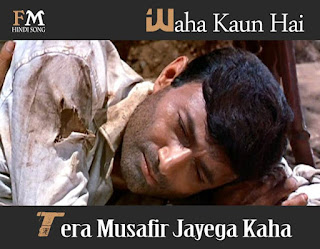The first film of Ashok Kumar was Jeevan Naiya (1936), a Bombay Talkies production. It was a sheer fluke that he became an actor. He didn't want to become an actor. Those days, actors were really looked down upon. They were believed to come from the lowest strata of society. He came to Bombay to become a director. So he joined Bombay Talkies as a technician. he worked in the camera department. Later, he was made a lab assistant. He worked as Lab Assistant for 8 months, suddenly Himanshu Rai, the owner of Bombay Talkies made him the hero of the film Jeevan Naiya replacing the existing hero Najam-ul- Hussain.
Initially, he was not comfortable in acting but later gathered confidence in his second film Achhut Kanya (1936), where he again paired with Devika Rani became a smash hit established him a great actor. After that, he was a permanent hero of all Bombay Talkies movies In 1943 he played the first anti-hero role in Indian cinema. The film Kismet(1943) was the first super duper hit of Indian cinema, It was the first film that collected more than a crore rupees at Box office. Post Kismet, Ashok Kumar became the most bankable star of the era, delivering a succession of box office successes with movies like Chal Chal Re Naujawan (1944), Shikari (1946), Sajan (1947), Mahal (1949), Sangram (1950) and Samadhi (1950).
, Ashok Kumar has ruled the silver screen and melted millions of hearts with his charismatic screen appearance and personality. He was the first superstar of Hindi cinema as well as the first lead actor to play an anti-hero. He also became the first star to reinvent himself, enjoying a long and hugely successful career as a character actor.






